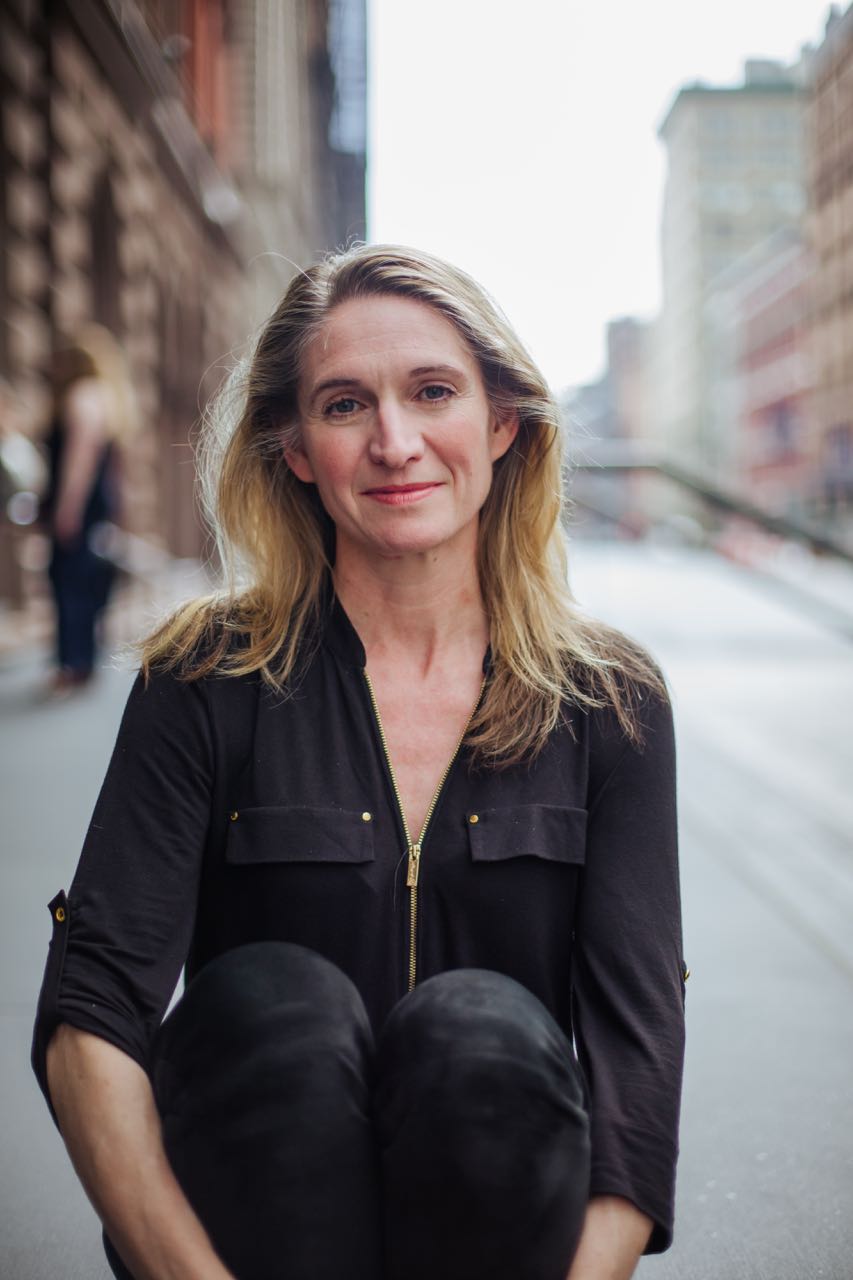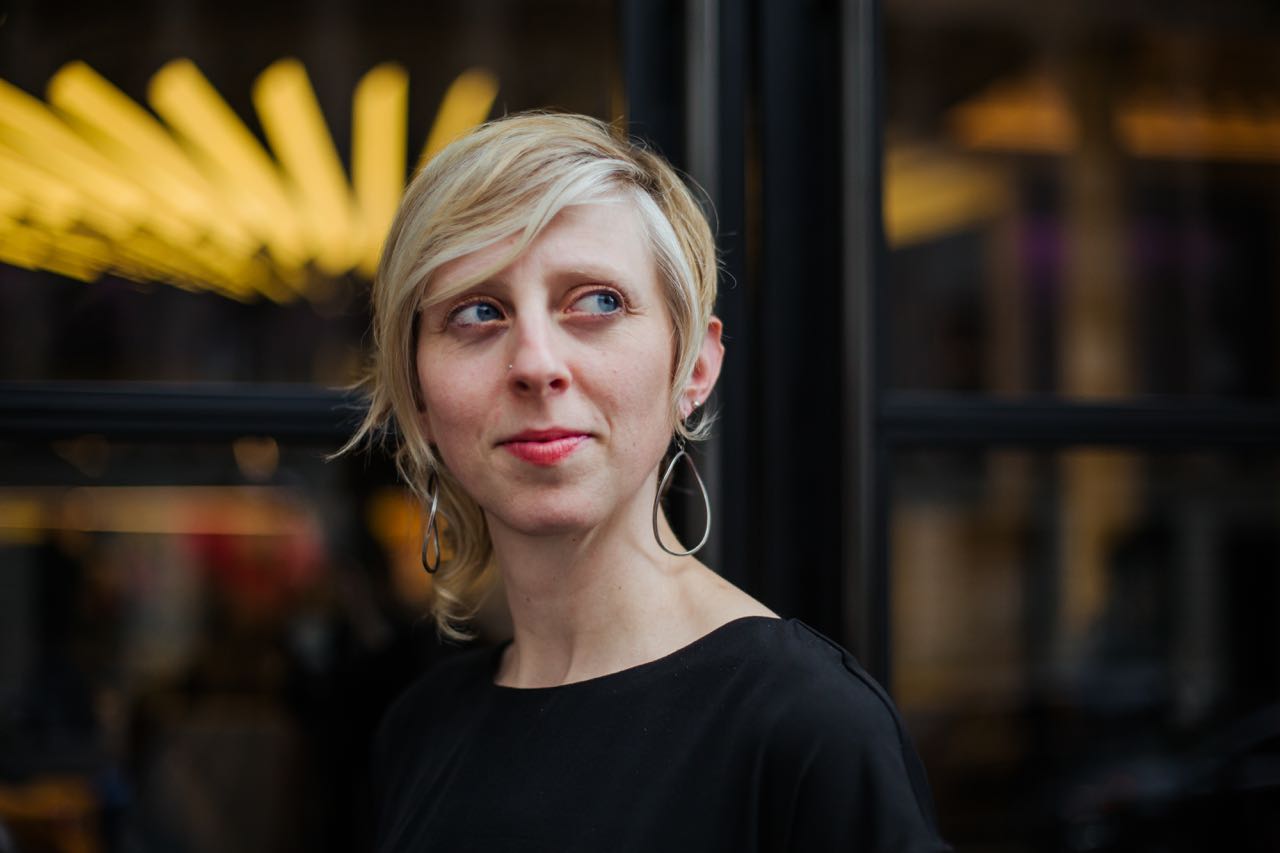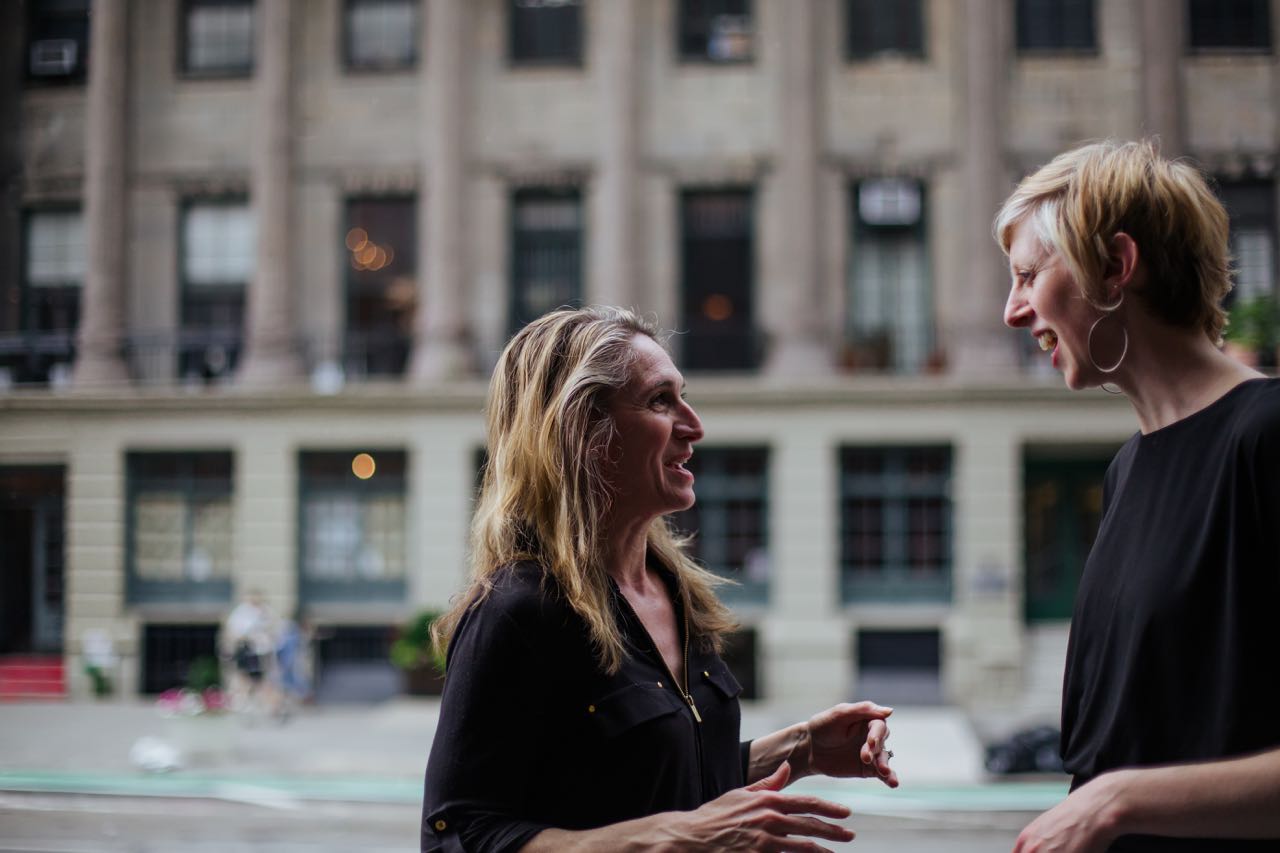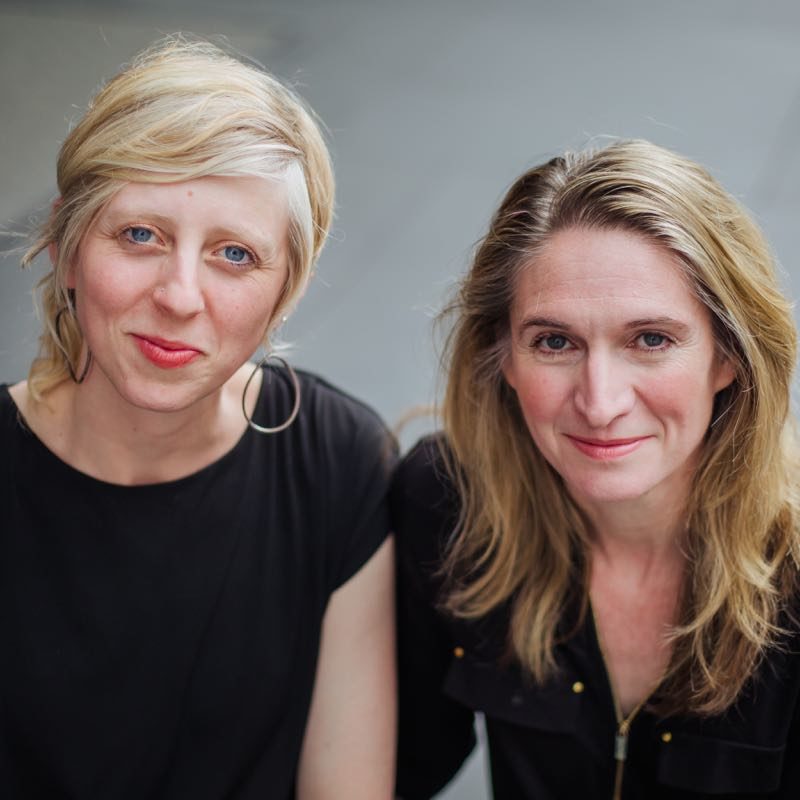Rinne Groff and Marissa Wolf on Fire in Dreamland

July 11th, 2018
Playwright Rinne Groff and director Marissa Wolf describe their collaboration as “very deep.” These two women support and understand each other as theatre makers, as parents, and as people. This summer, Rinne’s latest play, Fire in Dreamland, directed by Marissa, is making its New York debut at The Public Theater. Set in the days immediately following Hurricane Sandy, Fire in Dreamland tells the story of Kate’s encounter with Jaap, a European filmmaker who seems obsessed with making a film about the animals caught in a fire at Coney Island in 1911, and his friend Lance. The show is a memory play that experiments with, and at times even subverts, the audience’s expectations of a traditional romantic comedy narrative. I recently spoke with Rinne and Marissa about the journey and process of developing Fire in Dreamland, why the show’s unofficial subtitle is The Play About the Clacks, how art can be used to help dismantle social injustice, and more.
I’d like to start by talking about your collaboration, because Fire in Dreamland isn’t the first show that you two have worked on together.
Marissa: We’ve been working together since the spring of 2014, I think.
Rinne: It was a fortuitous kind of meeting, where I was doing a show [77%] at San Francisco Playhouse, and Marissa was recommended as a director. I probably did a bit of due diligence, asked around. But I do know that as soon as I spoke to her on the phone, I just thought, “This is going to be a pleasurable and meaningful experience.” And that proved to be true. One thing that I’d love to say in praise of Marissa, the highest praise that I could give, is that there are certain things, like the ending of the play, that we’re still messing with. I feel that we are on the same wavelength, to such an extent that I know that what she wants speaks to the play that I think I wrote. It’s none of that feeling of, “Ugh, they’re going to change that tonight. I better be there to see what it is they’re going to do.” It’s very much a feeling of, “Oh great, it may be exactly what I pictured, and it may be slightly different from what I pictured, but I know that’s it not some departure from what I believe in about the play.”
Have you developed a sort of shorthand at this point?
Rinne: I really like her taste and I really trust her, so I think we’re on a similar wavelength. We have a shorthand in the sense that I feel like I can say anything to her and she can say anything to me. But we don’t have a code or anything.
Marissa: I feel like we’ve had a very rich journey since 2014, when we did a play at San Francisco Playhouse, as Rinne said. Immediately I felt like we connected artistically, but also personally, because the play was thinking about being a working person who also has children. I was asking those questions in my own life, and Rinne lives in that space as well. For me, the inception of our working relationship and our collaboration goes very deep because Rinne is an artist whom I feel sees me deeply, or understands me deeply, also as a working parent and an artist parent. We were able to do [Fire in Dreamland] at Kansas City Rep and it was fortuitous. My husband and I and our drugged-up cat were driving cross-country to Kansas City Rep. Rinne called, and she was like, “I think we can get the green light from the Public and Berkeley Rep to do the first production at KC Rep. Do you want to do it with me?” I was like, “Yes. That’s the first pitch I will make in my new job as the Associate Artistic Director.” It was an amazing way to enter into that new space, bringing this incredible project. To me, it’s a very long, beautiful journey. Then we did that whole first production, and that was just for us in a way. The Public and Berkeley Rep both participated, but it was our production. Rinne is a very deep reviser, and so the play has transformed. It’s been exciting to approach it in a totally new way [at The Public]. New cast, new space, new designers. It’s really coming at it fresh.
Rinne: And learning very different things about it. Maybe that’s also about timing, and the timing in one’s life, and how things shift and change. But I also think that I am a slow writer, in the sense I can be intensely diligent, and I can bang out a draft if need be, and I have a very strong work ethic in that way, and I can get it done. But for me, once the draft gets done, that’s where the work begins. I think I didn’t expect to be revising as much in previews as I have been, but this cast is so exquisite, and the design team, too, is really game. Each night I’m learning something. It’s been a really joyous revision process. Sometimes I’m fearful in a revision process [because] I don’t want to overload them. Then, often, I feel more of that, “Ugh, I’ll just put a little band-aid on this.” In this process, because they’re so game, I really took a scene, put it in a blender, and spit out a new version of it, and they played it, and it worked beautifully. They really are actors who get that, “Oh, this is better. This is more work for me and the designers, but everybody wants the show to be better.”

Fire in Dreamland is currently in previews. Marissa, how do you, as a director, navigate your dual roles of working with Rinne on her revisions to the text while also guiding the cast as they rehearse and perform the show each night?
Marissa: I feel like a huge part of my job as director is to hold space for what Rinne’s hearing and what she wants to revise, while trying to swiftly and boldly revise on the visual side as well, so that the design team knows like, “Okay, this is a first pass of these transitions, but we’ve got to get back to the second pass because it’s going to tighten and clarify.” It’s an exciting balance of putting in new things in previews, with sharpening the things that have already existed. It’s very important for me that, from day one, [there is] joy around the project, that a sense of openness of spirit and exhilaration around creating new pathways remains through previews, because otherwise you can’t get the work done. I would almost say that the whole preview process is like a “yes, and” to each thing that we’re building with actors, design, and script. It’s like, “Wait, let’s build on that.” Or like, “Wait, we saw that. That doesn’t work.”
This play is written by a woman, directed by a woman, and features a female protagonist. Has that dynamic impacted the way people engage with each other in the rehearsal room?
Rinne: I love our room. I love working with Marissa, obviously. Does that have anything to do with gender? I don’t know. But there are things about our shared journey, in terms of being working parents. I mean, at Berkeley Rep, she said, “I have to pump.” I was like, “I don’t mind sitting here.” We could talk to each other about the play while one of us was breastfeeding or pumping. Pumping is somehow more humiliating, in its way.
Marissa: Of course, we’ve both worked with, and are working with, many wonderful male artists as well, but there is something about seeing and being seen that’s just special. When you have your roots in a handicapped bathroom pumping milk and jotting notes and ideas as a team, anything is possible.
Rinne: Right. I’d like to believe that that doesn’t have to be because we are both women. And not all women will have children, but those who do are negotiating something very specific with babies, about being the food source, which is something that men do not have to negotiate in that way. But I think the more that can come into any workspace feels like a good thing to me. Another sweet example is that we check in [with each other] in the morning to say, “Okay, what are we going to do?” When one or the other of our children [needs us], it’s like, “Okay, you go do that, and we’ll check in later.” For neither of us does that feel like, “I’m failing in my role as director or writer. I’m not serious in my role.”
Marissa: Not all my work phone calls go that way. There are work phone calls where I run away and shut a door, because I’m like, “I can’t have my child heard.” But you don’t want that on your projects. [In situations] where you are honest and vulnerable and rolling up your sleeves to really dig in, you want to bring your whole self.
A friend and I saw the play together and, afterwards, we discussed how it almost felt like the standard archetypal gender roles were reversed. In many ways, Jaap seems more representative of the manic pixie dream girl trope, whereas Kate is the protagonist, trying to find her way.
Rinne: I love that. What you just said reminded me that when I first started working on the play, I told my husband, “It’s about a bureaucrat and an artist.” He kept getting confused by what I was telling him. And then suddenly I realized, and he confessed, “Oh! I immediately cast those genders opposite. I cast the male as the bureaucrat, and I cast the female as the artist.” My husband is not a bureaucrat; he’s a physician. His reason for assuming that I would place the female as the artist is not based in nothing, but still I thought it was really funny that we were running into this roadblock in the conversation.
Marissa: I think the play frames Kate’s journey. The play is asking about her. I do feel like it’s her memory play. It is a memory play in that it’s her lens that we’re experiencing the world through in many ways. So I love your interpretation, actually, of Jaap as manic pixie dream girl. I think that’s great!
Rinne: And also, it makes me want to see the movie in which the manic pixie dream girl is interrogated as much as Jaap is interrogated.
Do you sense any marked change in how audiences are responding to this piece here as opposed to in the Midwest [where it premiered at Kansas City Rep]? This is a play that takes place in Brooklyn, and presumably some of the audience members were personally affected by Superstorm Sandy.
Marissa: I have a sense that people really liked it in Kansas City, but I think that what we’re gaining here are ah-ha moments with the references to New York, like a reference to a location, and a kind of shared sense of, “Yeah, we know that space.”
Rinne: Right. We just had one talk back, and the Superstorm Sandy-ness of it didn’t come up that much, but it’ll be interesting to see how and if that plays out. I have said this to Marissa before, but it’s always been a play about how you move forward after something devastating happens. This notion of, can you move forward after something devastating happens? And how do some people do that, and who gets stuck and why? I feel that question about what one does after something devastating happens rings more clearly to me in the play. I certainly hear it more in terms of our current political climate, and I feel that present more.
Rinne: A friend did write something to me about how it’s so good to hear this play now. I feel that that’s what she was getting at, that there’s something, sadly, very alive in this moment right now. You’re unhappy about things as they are. How do you respond to that?

What was the impetus behind combining the 1911 Coney Island fire with Superstorm Sandy?
Rinne: I started thinking about this play so long ago. I mean, seven years ago, something like that. So I started working on this play before Superstorm Sandy happened. I was thinking about this play, and then I got this offer from Baltimore Center Stage. On their 50th anniversary, they asked 50 writers to write a monologue. I think the title of the monologue was “What is Your America?” I had just been starting to think about this play, so I said, “Okay, well let me dive in.” I wrote this monologue for Jaap telling this story [about the Coney Island fire], and then it turns into a pitch where he’s trying to get money out of somebody. So that’s how I entered into the play, and that was, I believe, before Superstorm Sandy happened. Then Superstorm Sandy happened, and when it happened, I had this ridiculous solipsistic reaction of, “Oh no, this has wrecked my play.” As soon as I had that reaction, fortunately, I also had the perspective to be able to say, “That is a very Jaap reaction, to take what’s happening in the universe and only see how it impacts your particular artistic process.” An artist needs a little bit of that narcissism, and needs a little bit of that [feeling of] “what I’m doing is so deeply important.” But perspective is also good. But as soon as I had that impulse of “Oh right, this is how he would feel about this,” it opened the door for me to be able to let that into the play. Then I had this amazing experience, in which I realized, “It’s going to be set a little bit after the storm.” So, I literally was out there in the days when these scenes were written. We had this really funny moment, where we were talking about something about the set, and I said, “Oh, I think I have pictures on my computer of this day on Coney Island. This day that I’m setting it on, I can show you what the dunes looked like then because they were all sort of beautiful and natural.” That was really fun.
Marissa: You had gorgeous photos.
Rinne: That’s never ever happened to me before, that I was like, “Let me show you exactly what that day when this is supposed to be happening looked like.” I think that, perhaps, there was a time when I thought it would be evenly weighted between 1911 and the present, and that there would be more telling of that [1911] story, or an acting out of that story. Superstorm Sandy grabbed ahold of the play and said, “Let’s be in the present or in the near past.” I joke now that it is sort of a historical play, but in a different way than I thought it would be.
You mentioned earlier that Fire in Dreamland is a memory play. One of the creative choices that really stood out to me was the use of the slate [that the character of Lance clacks to signify flashbacks, scenes changes, etc.].
Rinne: Yeah. We call it the clacker.
It seemed like such a clever way to meld these two different mediums of theatre and film. Was the clacker a narrative device that the two of you came up with together as you worked through how to tell this cinematic story on a stage?
Marissa: That’s all Rinne.
Rinne: Well, from the beginning, I [told myself], “If you’re writing a play about a film, you need to let that inform the telling in some way.” So, the clacking was, on the page, an early conceptual thing about how to structure this event. We have had a lot of conversations about, “Well, what else can we do? How else can we play with that?”
Marissa: One really fun discovery was at the workshop at Berkeley Rep in the spring of 2015 when we were like, “Someone needs to do the clacking sound.” We had two pieces of wood; we didn’t have a slate at that time. We let the actor playing Lance just do it, and it was then that we were like, “Oh, it’s actually really interesting and kind of moving to have Lance clacking.” So, in that moment, that relationship was born in a new way. That was an exciting discovery. But yeah, the subtitle’s always secretly been The Play About the Clacks.
Rinne: The play about the clacks. And also I’ll say, in the play about the clacks, and speaking of theatre versus film in general, we made a bizarre discovery. Two pieces of wood being clacked together, or an actual clapper board being slated, in the room, sound amazing and do the job. At first, we were playing it with sound effects, and it never felt the same. We would even record the [clacking], but there was something about the recorded sound that was never satisfying. How come there’s something about this live sound that can not be recapitulated in a recording? It’s very spooky.
Marissa: And so beautifully theatrical in that way that it lives and breathes with us.
Rinne: That is the most amazing thing to me about it, and that surely was part of the gateway to saying, “It needs to be somebody on stage. Okay, so how are we going to deal with it?” Of course, the hilarious and fun part is Lance having to clack in his own scenes. Kyle Beltran, [who plays Lance] is amazing. I love the solutions that he’s come up with.

Does the fact that this is a memory play add to that choice, by revealing Kate’s perception of Lance? It must be a lot of fun to get to play with memory as a sort of self-construction of a reality, told by an unreliable narrator.
Rinne: Right. We just changed something tonight. We rewrote a certain scene tonight in terms of who enters first. We were talking about this scene, and what someone’s doing onstage at a given moment in a way could be a thought in Kate’s head, of what is happening in that moment. There’s something fun about that, and certainly Marissa and the actors have been playing very much with what it means in the play when a portion of text gets repeated. We’ve really played with that in lots of different ways. We’ve tried many different versions of what that means.
Marissa: For me, it is a question of how you theatricalize the way that memories are present for you in your daily life. It’s a hard and beautiful question to encounter. The actors have such a beautiful honesty and soulfulness, all three of them, in their connection to the hunger, desperation, and hopefulness of the roles.
Kate feels compelled to have some sort of meaningful impact on the world. Is that something that you’ve thought about, and perhaps related to, as you’ve both worked on this play?
Rinne: I suppose as the writer of the text, the answer must be “surely,” because I created this person who is struggling with it, asking those questions about what a life of meaning is. How one keeps a promise, if a promise is made to do something that will have meaningful impact on the world, what keeping that promise is—that’s something I think about. In the play, the jury is still out on the question of what has impact and how. It was important to me that each of those three characters is asking questions about that, which I suppose mirror my own questions. I, again, don’t feel that I have the answer to that question, but obviously I’m asking that question.
Marissa: I do connect to that very much. I feel like there is a constant question, especially in such a dire political and social time, that’s like, “What heavy lifting am I doing to dismantle injustice?” I do not feel that art can do all the dismantling. Art is one piece of a much larger puzzle of the choices one makes, in terms of one’s energy, volunteering, and making space and showing up. But the art part is important, I think. Maybe, for me, it has to do with working on projects that, like this project, allow for the question to be asked. What is my relationship to disaster, not only personal disaster, but how I engage with the world around me? I think that the seed of that is embedded in this project, and in one’s work.

